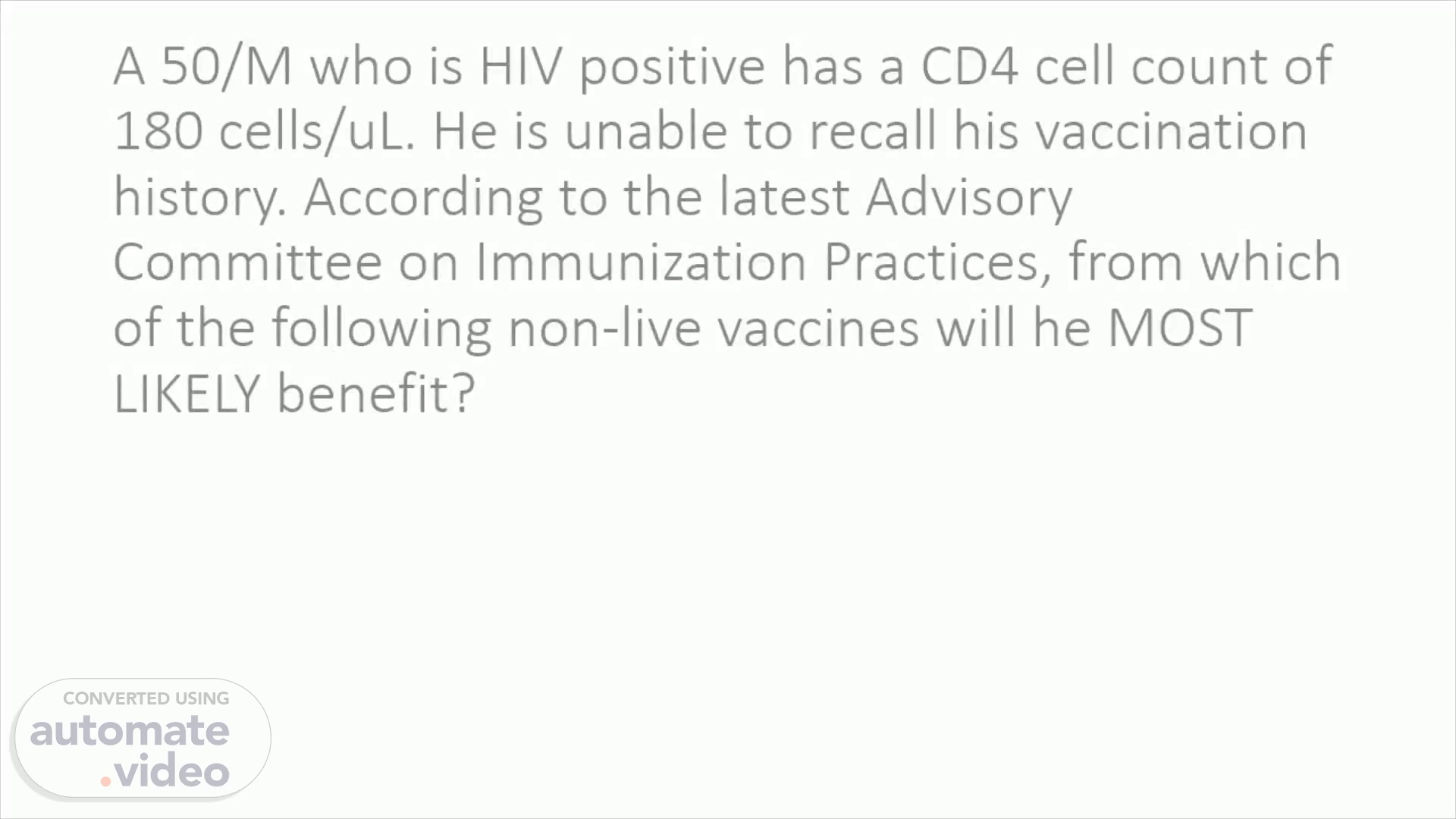
A 50/M who is HIV positive has a CD4 cell count of 180 cells/uL. He is unable to recall his vaccination history. According to the latest Advisory Committee on Immunization Practices, from which of the following non-live vaccines will he MOST LIKELY benefi
Scene 1 (0s)
[Audio] A 50/M who is HIV positive has a CD4 cell count of 180 cells/uL. He is unable to recall his vaccination history. According to the latest Advisory Committee on Immunization Practices, from which of the following non-live vaccines will he MOST LIKELY benefit? Answer:Pneumococcal conjugate ( Measles AND Varicella are live vaccines contraindicated in patients with HIV whose CD4 is < 200 cells/uL. The pneumococcal conjugate vaccine and recombinant varicella zoster vaccine are the non-live vaccines in the options listed. However, there are no recommendations from ACIP re the recombinant zoster vaccine)..
Scene 2 (47s)
[Audio] Which of the following vaccine:clinical scenarios will require temporary deferment of vaccination? Answer: Influenza: older adult with hypotension because of dengue virus infection. In general, vaccine administration should be deferred in moderate or severe acute illness (with or without fever) until illness resolves to avoid the superimposition of adverse effects of vaccination on the underlying illness and the mistaken attribution to the vaccine. All other options are contraindications..
Scene 3 (1m 23s)
[Audio] Which of the following clinical scenarios is NOT a contraindication to administering live vaccines? Answer: Breastfeeding Administration of live (and non-live) vaccines are recommended in breastfeeding patients who meet age requirements or who have other co-morbid conditions..
Scene 4 (1m 44s)
[Audio] To reduce the risk of injection-site reactions, what is the needle size (in inches) used to administer the pneumococcal polysaccharide vaccine in a female who weighs 68 kilogram? Answer: 1. Although the PPSV can be administered through either the SC or IM route, the latter lowers the risk of injection site reactions. Based on the patient's sex and weight a 1-inch needle should be used for IM administration of the vaccine..
Scene 5 (2m 16s)
[Audio] A 62 year old ale with history of alcoholism sought consult regarding receiving the following vaccines: pneumococcal conjugate, varicella, recombinant zoster vaccine, combination hepatitis A and B, and inactivated influenza. What is the BEST advice to provide in relation to simultaneous vaccine administration? Answer: Efficacy of vaccines are maintained if he receives the vaccines all at the same visit. administration of all needed vaccines at one visit is encouraged. Simultaneous administration does not affect immunogenicity of vaccines, nor does it increase the risk of adverse events. Option D is false: vaccine administered on the deltoid may be separated by 1- 2 inches to monitor for local reactions. Also, option A is false because as a non-live vaccine, the recombinant zoster vaccine may be administered at the same time as the live varicella virus vaccine..
Scene 6 (3m 22s)
[Audio] A patient with chronic kidney disease has an anti-HBs titer level that is below the recommended levels. He has received the first 2 doses of his 3-dose HBV vaccine; his 2nd dose was administered last week of April this year. Which of the following statements is TRUE regarding appropriate interval of administration of the patient's 3rd HBV vaccine dose? Answer: He may receive it during the last week of October.. As a multi-dose vaccine, the HBV vaccine is administered at 0, 1, 6 months. Giving the vaccine dose too early affects immunogenicity. There is no need to repeat the primary series for this patient because he has yet to receive his 3rd dose which is due on the last week of October this year. Although the number of doses for the HBV vaccine depends on the type of vaccine used, the patient's medical condition may affect immunogenicity and may have to receive more than 3 doses of the HBV vaccine..
Scene 7 (4m 28s)
[Audio] Which of the following post vaccination adverse events are reportable? Answer: Both Lymphadenopathy and Fever All adverse events are reportable..
Scene 8 (4m 42s)
[Audio] In addition to the inactivated influenza vaccine and recombinant zoster vaccine, a 50 y/ o patient without other medical conditions is recommended to receive which vaccine? Answer: TdaP Options B-D are recommended if with risk factor-based indications..
Scene 9 (5m 4s)
[Audio] Who among the following patients will benefit from influenza immunization? Answer: 50 y/ o person with HIV with undetectable viral load. There are certain population considered at high risk for influenza infection and should be given high priority status for influenza immunization..
Scene 10 (5m 26s)
[Audio] According to the World Health Organization [ WHO] recommendations for tetanus immunization, what is the recommended schedule for a female at 32 weeks AOG who has not received a tetanus vaccine? Answer: 0, 1, 6 months then one Td for every pregnancy thereafter. A non-immunized pregnant patient should receive 2 doses of Td separated by 4 weeks, then a 3rd dose after 6 months (i.e., 0, 1, 6) then one dose of Td for every pregnancy thereafter up to 5 doses for long term immunity..